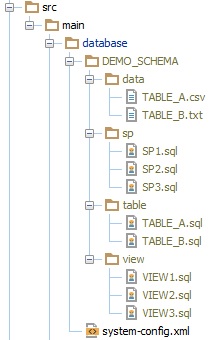Deploying tables for a new application?
Or looking to improve the DB Deployment of a years-old system with hundreds (or thousands) of tables, views, stored procedures, and other objects?
Obevo has your use case covered.
Supported platforms: DB2, H2, HSQLDB, Microsoft SQL Server, MongoDB, Oracle, PostgreSQL, Redshift (from Amazon), Sybase ASE, Sybase IQ
MongoDB support is here in version 6.5.0!
This is the first non-RDBMS platform supported, which shows that the object-based management pattern described here can be applicable elsewhere.
Feel free to reach out to us if you'd like to apply our core algorithm onto a new use case.
| Getting Started |
|---|
| Documentation |
| Quickstart Examples (Setup a new database or Onboard an existing database) |
| NY JavaSIG Presentation |
| InfoQ Publication - Introducing Obevo: Get Your Database SDLC under Control |
| APIs | Build Integration |
|---|---|
| Java API | Maven |
| Command Line API | Gradle |
Docker image is available at Docker Hub: shantstepanian/obevo
Please see the Contribution Guide.
By allowing your DB files to be maintained per DB object (as you would with classes in application code), db file maintenance becomes much easier compared to DB Deployment tools that require a new file or change definition per migration:
- Changes for a particular table can be reviewed in one place
- Stateless objects like stored procedures and views can be edited in place without specifying any new incremental change files
- All of this is possible without having to define the complete order of your file deployments; Obevo figures it out for you (a la a Java compiler compiling classes)
Click here for more information on how Obevo works and how its algorithm compares to what most other DB Deployment tools do
How do you test your DDLs before deploying to production?
Obevo provides utilities and build plugins to clean and rebuild your databases so that you can integrate that step into your integration testing lifecycle.
Obevo can take that a step further by converting your DB table and view code into an in-memory database compatible format that you can use in your tests. The conversion is done at runtime, so you do not have to maintain separate DDLs just for in-memory testing
Hesitant about getting your existing database schema under SDLC control due to how objects your application has built up over the years? Obevo has been vetted against many such cases from applications in large enterprises.
Obevo can be invoked via:
Obevo is designed to allow your DB code to be packaged and deployed alongside your application binaries.
Treat your DB code like you would treat your application code!



